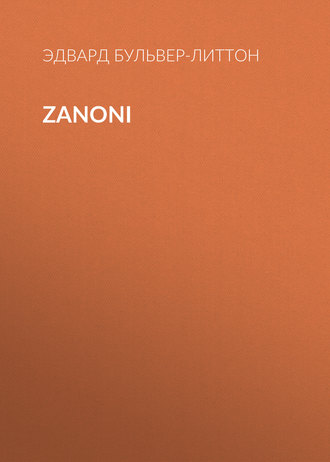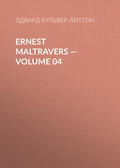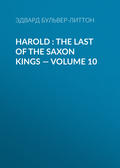
Эдвард Бульвер-Литтон
Zanoni
“‘You speak well, sir,’ said Zanoni, gravely. ‘The prince dares not produce his prize!’
“The prince remained speechless for a few moments, as if with indignation. At last he broke out into expressions the most injurious and insulting against Signor Zanoni and myself. Zanoni replied not; I was more hot and hasty. The guests appeared to delight in our dispute. None, except Mascari, whom we pushed aside and disdained to hear, strove to conciliate; some took one side, some another. The issue may be well foreseen. Swords were called for and procured. Two were offered me by one of the party. I was about to choose one, when Zanoni placed in my hand the other, which, from its hilt, appeared of antiquated workmanship. At the same moment, looking towards the prince, he said, smilingly, ‘The duc takes your grandsire’s sword. Prince, you are too brave a man for superstition; you have forgot the forfeit!’ Our host seemed to me to recoil and turn pale at those words; nevertheless, he returned Zanoni’s smile with a look of defiance. The next moment all was broil and disorder. There might be some six or eight persons engaged in a strange and confused kind of melee, but the prince and myself only sought each other. The noise around us, the confusion of the guests, the cries of the musicians, the clash of our own swords, only served to stimulate our unhappy fury. We feared to be interrupted by the attendants, and fought like madmen, without skill or method. I thrust and parried mechanically, blind and frantic, as if a demon had entered into me, till I saw the prince stretched at my feet, bathed in his blood, and Zanoni bending over him, and whispering in his ear. That sight cooled us all. The strife ceased; we gathered, in shame, remorse, and horror, round our ill-fated host; but it was too late,—his eyes rolled fearfully in his head. I have seen many men die, but never one who wore such horror on his countenance. At last all was over! Zanoni rose from the corpse, and, taking, with great composure, the sword from my hand, said calmly, ‘Ye are witnesses, gentlemen, that the prince brought his fate upon himself. The last of that illustrious house has perished in a brawl.’
“I saw no more of Zanoni. I hastened to our envoy to narrate the event, and abide the issue. I am grateful to the Neapolitan government, and to the illustrious heir of the unfortunate nobleman, for the lenient and generous, yet just, interpretation put upon a misfortune the memory of which will afflict me to the last hour of my life.
(Signed) “Louis Victor, Duc de R.”
In the above memorial, the reader will find the most exact and minute account yet given of an event which created the most lively sensation at Naples in that day.
Glyndon had taken no part in the affray, neither had he participated largely in the excesses of the revel. For his exemption from both he was perhaps indebted to the whispered exhortations of Zanoni. When the last rose from the corpse, and withdrew from that scene of confusion, Glyndon remarked that in passing the crowd he touched Mascari on the shoulder, and said something which the Englishman did not overhear. Glyndon followed Zanoni into the banquet-room, which, save where the moonlight slept on the marble floor, was wrapped in the sad and gloomy shadows of the advancing night.
“How could you foretell this fearful event? He fell not by your arm!” said Glyndon, in a tremulous and hollow tone.
“The general who calculates on the victory does not fight in person,” answered Zanoni; “let the past sleep with the dead. Meet me at midnight by the sea-shore, half a mile to the left of your hotel. You will know the spot by a rude pillar—the only one near—to which a broken chain is attached. There and then, if thou wouldst learn our lore, thou shalt find the master. Go; I have business here yet. Remember, Viola is still in the house of the dead man!”
Here Mascari approached, and Zanoni, turning to the Italian, and waving his hand to Glyndon, drew the former aside. Glyndon slowly departed.
“Mascari,” said Zanoni, “your patron is no more; your services will be valueless to his heir,—a sober man whom poverty has preserved from vice. For yourself, thank me that I do not give you up to the executioner; recollect the wine of Cyprus. Well, never tremble, man; it could not act on me, though it might react on others; in that it is a common type of crime. I forgive you; and if the wine should kill me, I promise you that my ghost shall not haunt so worshipful a penitent. Enough of this; conduct me to the chamber of Viola Pisani. You have no further need of her. The death of the jailer opens the cell of the captive. Be quick; I would be gone.”
Mascari muttered some inaudible words, bowed low, and led the way to the chamber in which Viola was confined.
CHAPTER 3.XVIII
Merc: Tell me, therefore, what thou seekest after, and what thou wilt have. What dost thou desire to make?
Alch: The Philosopher’s Stone.
Sandivogius.
It wanted several minutes of midnight, and Glyndon repaired to the appointed spot. The mysterious empire which Zanoni had acquired over him, was still more solemnly confirmed by the events of the last few hours; the sudden fate of the prince, so deliberately foreshadowed, and yet so seemingly accidental, brought out by causes the most commonplace, and yet associated with words the most prophetic, impressed him with the deepest sentiments of admiration and awe. It was as if this dark and wondrous being could convert the most ordinary events and the meanest instruments into the agencies of his inscrutable will; yet, if so, why have permitted the capture of Viola? Why not have prevented the crime rather than punish the criminal? And did Zanoni really feel love for Viola? Love, and yet offer to resign her to himself,—to a rival whom his arts could not have failed to baffle. He no longer reverted to the belief that Zanoni or Viola had sought to dupe him into marriage. His fear and reverence for the former now forbade the notion of so poor an imposture. Did he any longer love Viola himself? No; when that morning he had heard of her danger, he had, it is true, returned to the sympathies and the fears of affection; but with the death of the prince her image faded from his heart, and he felt no jealous pang at the thought that she had been saved by Zanoni,—that at that moment she was perhaps beneath his roof. Whoever has, in the course of his life, indulged the absorbing passion of the gamester, will remember how all other pursuits and objects vanished from his mind; how solely he was wrapped in the one wild delusion; with what a sceptre of magic power the despot-demon ruled every feeling and every thought. Far more intense than the passion of the gamester was the frantic yet sublime desire that mastered the breast of Glyndon. He would be the rival of Zanoni, not in human and perishable affections, but in preternatural and eternal lore. He would have laid down life with content—nay, rapture—as the price of learning those solemn secrets which separated the stranger from mankind. Enamoured of the goddess of goddesses, he stretched forth his arms—the wild Ixion—and embraced a cloud!
The night was most lovely and serene, and the waves scarcely rippled at his feet as the Englishman glided on by the cool and starry beach. At length he arrived at the spot, and there, leaning against the broken pillar, he beheld a man wrapped in a long mantle, and in an attitude of profound repose. He approached, and uttered the name of Zanoni. The figure turned, and he saw the face of a stranger: a face not stamped by the glorious beauty of Zanoni, but equally majestic in its aspect, and perhaps still more impressive from the mature age and the passionless depth of thought that characterised the expanded forehead, and deep-set but piercing eyes.
“You seek Zanoni,” said the stranger; “he will be here anon; but, perhaps, he whom you see before you is more connected with your destiny, and more disposed to realise your dreams.”
“Hath the earth, then, another Zanoni?”
“If not,” replied the stranger, “why do you cherish the hope and the wild faith to be yourself a Zanoni? Think you that none others have burned with the same godlike dream? Who, indeed in his first youth,—youth when the soul is nearer to the heaven from which it sprang, and its divine and primal longings are not all effaced by the sordid passions and petty cares that are begot in time,—who is there in youth that has not nourished the belief that the universe has secrets not known to the common herd, and panted, as the hart for the water-springs, for the fountains that lie hid and far away amidst the broad wilderness of trackless science? The music of the fountain is heard in the soul WITHIN, till the steps, deceived and erring, rove away from its waters, and the wanderer dies in the mighty desert. Think you that none who have cherished the hope have found the truth, or that the yearning after the Ineffable Knowledge was given to us utterly in vain? No! Every desire in human hearts is but a glimpse of things that exist, alike distant and divine. No! in the world there have been from age to age some brighter and happier spirits who have attained to the air in which the beings above mankind move and breathe. Zanoni, great though he be, stands not alone. He has had his predecessors, and long lines of successors may be yet to come.”
“And will you tell me,” said Glyndon, “that in yourself I behold one of that mighty few over whom Zanoni has no superiority in power and wisdom?”
“In me,” answered the stranger, “you see one from whom Zanoni himself learned some of his loftiest secrets. On these shores, on this spot, have I stood in ages that your chroniclers but feebly reach. The Phoenician, the Greek, the Oscan, the Roman, the Lombard, I have seen them all!—leaves gay and glittering on the trunk of the universal life, scattered in due season and again renewed; till, indeed, the same race that gave its glory to the ancient world bestowed a second youth upon the new. For the pure Greeks, the Hellenes, whose origin has bewildered your dreaming scholars, were of the same great family as the Norman tribe, born to be the lords of the universe, and in no land on earth destined to become the hewers of wood. Even the dim traditions of the learned, which bring the sons of Hellas from the vast and undetermined territories of Northern Thrace, to be the victors of the pastoral Pelasgi, and the founders of the line of demi-gods; which assign to a population bronzed beneath the suns of the West, the blue-eyed Minerva and the yellow-haired Achilles (physical characteristics of the North); which introduce, amongst a pastoral people, warlike aristocracies and limited monarchies, the feudalism of the classic time,—even these might serve you to trace back the primeval settlements of the Hellenes to the same region whence, in later times, the Norman warriors broke on the dull and savage hordes of the Celt, and became the Greeks of the Christian world. But this interests you not, and you are wise in your indifference. Not in the knowledge of things without, but in the perfection of the soul within, lies the empire of man aspiring to be more than man.”
“And what books contain that science; from what laboratory is it wrought?”
“Nature supplies the materials; they are around you in your daily walks. In the herbs that the beast devours and the chemist disdains to cull; in the elements from which matter in its meanest and its mightiest shapes is deduced; in the wide bosom of the air; in the black abysses of the earth; everywhere are given to mortals the resources and libraries of immortal lore. But as the simplest problems in the simplest of all studies are obscure to one who braces not his mind to their comprehension; as the rower in yonder vessel cannot tell you why two circles can touch each other only in one point,—so though all earth were carved over and inscribed with the letters of diviner knowledge, the characters would be valueless to him who does not pause to inquire the language and meditate the truth. Young man, if thy imagination is vivid, if thy heart is daring, if thy curiosity is insatiate, I will accept thee as my pupil. But the first lessons are stern and dread.”
“If thou hast mastered them, why not I?” answered Glyndon, boldly. “I have felt from my boyhood that strange mysteries were reserved for my career; and from the proudest ends of ordinary ambition I have carried my gaze into the cloud and darkness that stretch beyond. The instant I beheld Zanoni, I felt as if I had discovered the guide and the tutor for which my youth had idly languished and vainly burned.”
“And to me his duty is transferred,” replied the stranger. “Yonder lies, anchored in the bay, the vessel in which Zanoni seeks a fairer home; a little while and the breeze will rise, the sail will swell; and the stranger will have passed, like a wind, away. Still, like the wind, he leaves in thy heart the seeds that may bear the blossom and the fruit. Zanoni hath performed his task,—he is wanted no more; the perfecter of his work is at thy side. He comes! I hear the dash of the oar. You will have your choice submitted to you. According as you decide we shall meet again.” With these words the stranger moved slowly away, and disappeared beneath the shadow of the cliffs. A boat glided rapidly across the waters: it touched land; a man leaped on shore, and Glyndon recognised Zanoni.
“I give thee, Glyndon,—I give thee no more the option of happy love and serene enjoyment. That hour is past, and fate has linked the hand that might have been thine own to mine. But I have ample gifts to bestow upon thee, if thou wilt abandon the hope that gnaws thy heart, and the realisation of which even I have not the power to foresee. Be thine ambition human, and I can gratify it to the full. Men desire four things in life,—love, wealth, fame, power. The first I cannot give thee, the rest are at my disposal. Select which of them thou wilt, and let us part in peace.”
“Such are not the gifts I covet. I choose knowledge; that knowledge must be thine own. For this, and for this alone, I surrendered the love of Viola; this, and this alone, must be my recompense.”
“I cannot gain say thee, though I can warn. The desire to learn does not always contain the faculty to acquire. I can give thee, it is true, the teacher,—the rest must depend on thee. Be wise in time, and take that which I can assure to thee.”
“Answer me but these questions, and according to your answer I will decide. Is it in the power of man to attain intercourse with the beings of other worlds? Is it in the power of man to influence the elements, and to insure life against the sword and against disease?”
“All this may be possible,” answered Zanoni, evasively, “to the few; but for one who attains such secrets, millions may perish in the attempt.”
“One question more. Thou—”
“Beware! Of myself, as I have said before, I render no account.”
“Well, then, the stranger I have met this night,—are his boasts to be believed? Is he in truth one of the chosen seers whom you allow to have mastered the mysteries I yearn to fathom?”
“Rash man,” said Zanoni, in a tone of compassion, “thy crisis is past, and thy choice made! I can only bid thee be bold and prosper; yes, I resign thee to a master who HAS the power and the will to open to thee the gates of an awful world. Thy weal or woe are as nought in the eyes of his relentless wisdom. I would bid him spare thee, but he will heed me not. Mejnour, receive thy pupil!” Glyndon turned, and his heart beat when he perceived that the stranger, whose footsteps he had not heard upon the pebbles, whose approach he had not beheld in the moonlight, was once more by his side.
“Farewell,” resumed Zanoni; “thy trial commences. When next we meet, thou wilt be the victim or the victor.”
Glyndon’s eyes followed the receding form of the mysterious stranger. He saw him enter the boat, and he then for the first time noticed that besides the rowers there was a female, who stood up as Zanoni gained the boat. Even at the distance he recognised the once-adored form of Viola. She waved her hand to him, and across the still and shining air came her voice, mournfully and sweetly, in her mother’s tongue, “Farewell, Clarence,—I forgive thee!—farewell, farewell!”
He strove to answer; but the voice touched a chord at his heart, and the words failed him. Viola was then lost forever, gone with this dread stranger; darkness was round her lot! And he himself had decided her fate and his own! The boat bounded on, the soft waves flashed and sparkled beneath the oars, and it was along one sapphire track of moonlight that the frail vessel bore away the lovers. Farther and farther from his gaze sped the boat, till at last the speck, scarcely visible, touched the side of the ship that lay lifeless in the glorious bay. At that instant, as if by magic, up sprang, with a glad murmur, the playful and freshening wind: and Glyndon turned to Mejnour and broke the silence.
“Tell me—if thou canst read the future—tell me that HER lot will be fair, and that HER choice at least is wise?”
“My pupil!” answered Mejnour, in a voice the calmness of which well accorded with the chilling words, “thy first task must be to withdraw all thought, feeling, sympathy from others. The elementary stage of knowledge is to make self, and self alone, thy study and thy world. Thou hast decided thine own career; thou hast renounced love; thou hast rejected wealth, fame, and the vulgar pomps of power. What, then, are all mankind to thee? To perfect thy faculties, and concentrate thy emotions, is henceforth thy only aim!”
“And will happiness be the end?”
“If happiness exist,” answered Mejnour, “it must be centred in a SELF to which all passion is unknown. But happiness is the last state of being; and as yet thou art on the threshold of the first.”
As Mejnour spoke, the distant vessel spread its sails to the wind, and moved slowly along the deep. Glyndon sighed, and the pupil and the master retraced their steps towards the city.
BOOK IV. – THE DWELLER OF THE THRESHOLD
Bey hinter ihm was will! Ich heb ihn auf.
“Das Verschleierte Bildzu Sais”
(Be behind what there may,—I raise the veil.)
CHAPTER 4.I
Come vittima io vengo all’ ara.
“Metast.,” At. ii. Sc. 7.
(As a victim I go to the altar.)
It was about a month after the date of Zanoni’s departure and Glyndon’s introduction to Mejnour, when two Englishmen were walking, arm-in-arm, through the Toledo.
“I tell you,” said one (who spoke warmly), “that if you have a particle of common-sense left in you, you will accompany me to England. This Mejnour is an imposter more dangerous, because more in earnest, than Zanoni. After all, what do his promises amount to? You allow that nothing can be more equivocal. You say that he has left Naples,—that he has selected a retreat more congenial than the crowded thoroughfares of men to the studies in which he is to initiate you; and this retreat is among the haunts of the fiercest bandits of Italy,—haunts which justice itself dares not penetrate. Fitting hermitage for a sage! I tremble for you. What if this stranger—of whom nothing is known—be leagued with the robbers; and these lures for your credulity bait but the traps for your property,—perhaps your life? You might come off cheaply by a ransom of half your fortune. You smile indignantly! Well, put common-sense out of the question; take your own view of the matter. You are to undergo an ordeal which Mejnour himself does not profess to describe as a very tempting one. It may, or it may not, succeed: if it does not, you are menaced with the darkest evils; and if it does, you cannot be better off than the dull and joyless mystic whom you have taken for a master. Away with this folly; enjoy youth while it is left to you; return with me to England; forget these dreams; enter your proper career; form affections more respectable than those which lured you awhile to an Italian adventuress. Attend to your fortune, make money, and become a happy and distinguished man. This is the advice of sober friendship; yet the promises I hold out to you are fairer than those of Mejnour.”
“Mervale,” said Glyndon, doggedly, “I cannot, if I would, yield to your wishes. A power that is above me urges me on; I cannot resist its influence. I will proceed to the last in the strange career I have commenced. Think of me no more. Follow yourself the advice you give to me, and be happy.”
“This is madness,” said Mervale; “your health is already failing; you are so changed I should scarcely know you. Come; I have already had your name entered in my passport; in another hour I shall be gone, and you, boy that you are, will be left, without a friend, to the deceits of your own fancy and the machinations of this relentless mountebank.”
“Enough,” said Glyndon, coldly; “you cease to be an effective counsellor when you suffer your prejudices to be thus evident. I have already had ample proof,” added the Englishman, and his pale cheek grew more pale, “of the power of this man,—if man he be, which I sometimes doubt,—and, come life, come death, I will not shrink from the paths that allure me. Farewell, Mervale; if we never meet again,—if you hear, amidst our old and cheerful haunts, that Clarence Glyndon sleeps the last sleep by the shores of Naples, or amidst yon distant hills, say to the friends of our youth, ‘He died worthily, as thousands of martyr-students have died before him, in the pursuit of knowledge.’”
He wrung Mervale’s hand as he spoke, darted from his side, and disappeared amidst the crowd.
By the corner of the Toledo he was arrested by Nicot.
“Ah, Glyndon! I have not seen you this month. Where have you hid yourself? Have you been absorbed in your studies?”
“Yes.”
“I am about to leave Naples for Paris. Will you accompany me? Talent of all order is eagerly sought for there, and will be sure to rise.”
“I thank you; I have other schemes for the present.”
“So laconic!—what ails you? Do you grieve for the loss of the Pisani? Take example by me. I have already consoled myself with Bianca Sacchini,—a handsome woman, enlightened, no prejudices. A valuable creature I shall find her, no doubt. But as for this Zanoni!”
“What of him?”
“If ever I paint an allegorical subject, I will take his likeness as Satan. Ha, ha! a true painter’s revenge,—eh? And the way of the world, too! When we can do nothing else against a man whom we hate, we can at least paint his effigies as the Devil’s. Seriously, though: I abhor that man.”
“Wherefore?’
“Wherefore! Has he not carried off the wife and the dowry I had marked for myself! Yet, after all,” added Nicot, musingly, “had he served instead of injured me, I should have hated him all the same. His very form, and his very face, made me at once envy and detest him. I felt that there is something antipathetic in our natures. I feel, too, that we shall meet again, when Jean Nicot’s hate may be less impotent. We, too, cher confrere,—we, too, may meet again! Vive la Republique! I to my new world!”
“And I to mine. Farewell!”
That day Mervale left Naples; the next morning Glyndon also quitted the City of Delight alone, and on horseback. He bent his way into those picturesque but dangerous parts of the country which at that time were infested by banditti, and which few travellers dared to pass, even in broad daylight, without a strong escort. A road more lonely cannot well be conceived than that on which the hoofs of his steed, striking upon the fragments of rock that encumbered the neglected way, woke a dull and melancholy echo. Large tracts of waste land, varied by the rank and profuse foliage of the South, lay before him; occasionally a wild goat peeped down from some rocky crag, or the discordant cry of a bird of prey, startled in its sombre haunt, was heard above the hills. These were the only signs of life; not a human being was met,—not a hut was visible. Wrapped in his own ardent and solemn thoughts, the young man continued his way, till the sun had spent its noonday heat, and a breeze that announced the approach of eve sprung up from the unseen ocean which lay far distant to his right. It was then that a turn in the road brought before him one of those long, desolate, gloomy villages which are found in the interior of the Neapolitan dominions: and now he came upon a small chapel on one side the road, with a gaudily painted image of the Virgin in the open shrine. Around this spot, which, in the heart of a Christian land, retained the vestige of the old idolatry (for just such were the chapels that in the pagan age were dedicated to the demon-saints of mythology), gathered six or seven miserable and squalid wretches, whom the curse of the leper had cut off from mankind. They set up a shrill cry as they turned their ghastly visages towards the horseman; and, without stirring from the spot, stretched out their gaunt arms, and implored charity in the name of the Merciful Mother! Glyndon hastily threw them some small coins, and, turning away his face, clapped spurs to his horse, and relaxed not his speed till he entered the village. On either side the narrow and miry street, fierce and haggard forms—some leaning against the ruined walls of blackened huts, some seated at the threshold, some lying at full length in the mud—presented groups that at once invoked pity and aroused alarm: pity for their squalor, alarm for the ferocity imprinted on their savage aspects. They gazed at him, grim and sullen, as he rode slowly up the rugged street; sometimes whispering significantly to each other, but without attempting to stop his way. Even the children hushed their babble, and ragged urchins, devouring him with sparkling eyes, muttered to their mothers; “We shall feast well to-morrow!” It was, indeed, one of those hamlets in which Law sets not its sober step, in which Violence and Murder house secure,—hamlets common then in the wilder parts of Italy, in which the peasant was but the gentler name for the robber.
Glyndon’s heart somewhat failed him as he looked around, and the question he desired to ask died upon his lips. At length from one of the dismal cabins emerged a form superior to the rest. Instead of the patched and ragged over-all, which made the only garment of the men he had hitherto seen, the dress of this person was characterised by all the trappings of the national bravery. Upon his raven hair, the glossy curls of which made a notable contrast to the matted and elfin locks of the savages around, was placed a cloth cap, with a gold tassel that hung down to his shoulder; his mustaches were trimmed with care, and a silk kerchief of gay hues was twisted round a well-shaped but sinewy throat; a short jacket of rough cloth was decorated with several rows of gilt filagree buttons; his nether garments fitted tight to his limbs, and were curiously braided; while in a broad parti-coloured sash were placed two silver-hilted pistols, and the sheathed knife, usually worn by Italians of the lower order, mounted in ivory elaborately carved. A small carbine of handsome workmanship was slung across his shoulder and completed his costume. The man himself was of middle size, athletic yet slender, with straight and regular features, sunburnt, but not swarthy; and an expression of countenance which, though reckless and bold, had in it frankness rather than ferocity, and, if defying, was not altogether unprepossessing.
Glyndon, after eyeing this figure for some moments with great attention, checked his rein, and asked the way to the “Castle of the Mountain.”
The man lifted his cap as he heard the question, and, approaching Glyndon, laid his hand upon the neck of the horse, and said, in a low voice, “Then you are the cavalier whom our patron the signor expected. He bade me wait for you here, and lead you to the castle. And indeed, signor, it might have been unfortunate if I had neglected to obey the command.”
The man then, drawing a little aside, called out to the bystanders in a loud voice, “Ho, ho! my friends, pay henceforth and forever all respect to this worshipful cavalier. He is the expected guest of our blessed patron of the Castle of the Mountain. Long life to him! May he, like his host, be safe by day and by night; on the hill and in the waste; against the dagger and the bullet,—in limb and in life! Cursed be he who touches a hair of his head, or a baioccho in his pouch. Now and forever we will protect and honour him,—for the law or against the law; with the faith and to the death. Amen! Amen!”
“Amen!” responded, in wild chorus, a hundred voices; and the scattered and straggling groups pressed up the street, nearer and nearer to the horseman.
“And that he may be known,” continued the Englishman’s strange protector, “to the eye and to the ear, I place around him the white sash, and I give him the sacred watchword, ‘Peace to the Brave.’ Signor, when you wear this sash, the proudest in these parts will bare the head and bend the knee. Signor, when you utter this watchword, the bravest hearts will be bound to your bidding. Desire you safety, or ask you revenge—to gain a beauty, or to lose a foe,—speak but the word, and we are yours: we are yours! Is it not so, comrades?”
And again the hoarse voices shouted, “Amen, Amen!”
“Now, signor,” whispered the bravo, “if you have a few coins to spare, scatter them amongst the crowd, and let us be gone.”
Glyndon, not displeased at the concluding sentence, emptied his purse in the streets; and while, with mingled oaths, blessings, shrieks, and yells, men, women, and children scrambled for the money, the bravo, taking the rein of the horse, led it a few paces through the village at a brisk trot, and then, turning up a narrow lane to the left, in a few minutes neither houses nor men were visible, and the mountains closed their path on either side. It was then that, releasing the bridle and slackening his pace, the guide turned his dark eyes on Glyndon with an arch expression, and said,—







